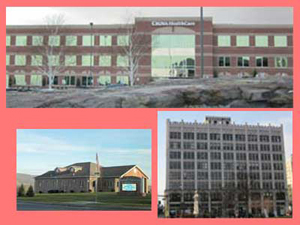North Carolina Dental Providers

USA Dental Edge breaks down oral care providers by county for the convenience of the customer/patient. Use the search tools here to find care near you.
North Carolina Counties
NC County List →About North Carolina
Residents of North Carolina find themselves in the same dilemna as people in every other state. The never-ending search for quality, affordable dental insurance for themselves or their families. Whether you live in the northeastern corner of the state near Elizabeth City, or the southwestern corner near Murphy, finding a value plan for your dentistry never seems to get any easier.
Along with fuel prices, food, utilities, taxes, and everything else, the costs associated with good dental care seem to keep rising. With the rise in prices comes the rise in rates for dental plans and insurance premiums.
The Tar Heel state is currently home to over 9.5 million people, each of whom require dental care at some point. If the market is there, the insurance companies will be too. Whether you live in the larger North Carolina cities: Charlotte, Raleigh, Greensboro, Winston-Salem, Durham, Fayetteville, Cary, Wilmington, High Point, Greenville or the smaller towns in between, finding dental care in NC is easy if you know where to look.
Sometimes the state's latest statistics can help guide you as well. Some of the relevant dental statistics for North Carolina can be found here if you are interested in more in-depth numbers to aid your research.
- Raleigh
- Greensboro
- Durham
- Fayetteville
- Wilmington
- High Point
- Winston-Salem
- Goldsboro
- Jacksonville
- Laurinburg
- Monroe
- Charlotte
- Lenoir
- Lumberton
- Boone
North Carolina Dental Statistics
It's amazing what statistics can tell us about society. Some simple data collection from everyday citizens paints a detailed picture of the state of oral health in the USA. Here are some interesting dental stats according to the Centers for Disease Control and Prevention:
- Nearly 78 percent of Americans have had at least one cavity before they reach the age of 18.
- 80 percent of the population residing in the USA has some form of gum (periodontal) disease.
- Americans make about 500 million dentist visits annually for preventive care and oral health issues
- American citizens, including residents of North Carolina, spend an estimated 98 billion dollars on dental services annually
- Overexposure to fluoride is higher in adolescents than in adults, those most affected are aged 12-15
- Most adults show signs of periodontal disease, with severe periodontal disease affecting approximately 14 percent of adults
- Men are more likely than women to have more severe dental diseases including oral cancer
- Three out of every four patients don't change their toothbrush as often as is recommended
- As many as 16 percent of children between 6 and 19 and 23 percent of adults age 20 and up have untreated cavities
Some basic statistics about North Carolina can put the current state of dental health care into perspective. The U.S. Census Bureau takes a census of the population every 10 years. They conduct censuses of business activity every five years. They also conduct various other surveys on an annual basis. The following data is derived from the 2020 Census as well as other surveys of business activity in North Carolina.
(Stand by, detailed statistics are still being configured...)
Latest data derived from Census.org | Centers for Disease Control and Prevention
UDE is user supported. When you buy through our site, we may earn a small affiliate commission, our full disclosure is here.Does North Carolina Have Enough Dentists?
The availability of dentists in North Carolina, as in any state, can be influenced by various factors, including population density, geographic distribution, the number of dental schools, government policies, and changes in dental workforce trends.
In general, North Carolina, like many states, has faced challenges with dental care access in certain underserved areas, particularly in rural and economically disadvantaged regions. While some areas of the state may have an adequate number of dentists to serve the population, other areas may experience shortages, leading to limited access to dental care for some residents.
Efforts have been made at the state and national levels to address dental care access disparities. These initiatives include expanding dental education programs, offering loan repayment incentives for dentists who practice in underserved areas, and promoting the use of telehealth technologies for dental consultations.
If you are concerned about dental care access in a specific area of North Carolina, I recommend consulting recent data from official sources such as the North Carolina Department of Health and Human Services or the North Carolina Dental Society.
These sources may provide insights into the distribution of dentists across the state and the efforts being made to improve dental care access for the population. Additionally, local health departments and community health centers may have information on available dental services in specific areas.
Finding Dental Care in High Crime Areas
Crime rates can fluctuate over time, and it's essential to refer to the most recent data from official sources such as the North Carolina Department of Public Safety or the Federal Bureau of Investigation (FBI) Uniform Crime Reporting Program for the latest information on crime rates in North Carolina. Dentists are however located throughout the state regardless of crime rates. Crime rates generally increase with population density so here are the most populus cities:
- Charlotte: As the largest city in North Carolina, Charlotte is a major financial hub and a center for business and commerce. It is known for its diverse economy, vibrant cultural scene, and professional sports teams.
- Raleigh: The capital city of North Carolina, Raleigh, is part of the Research Triangle Park (RTP) area, which includes Durham and Chapel Hill. The region is a major hub for technology, research, and education.
- Greensboro: Greensboro is known for its strong manufacturing and transportation sectors and is home to various colleges and universities.
- Durham: Located in the Research Triangle area, Durham is renowned for its medical and scientific research institutions, including Duke University and Duke University Medical Center.
- Winston-Salem: Winston-Salem has a rich history in tobacco and textile industries, and it is home to Wake Forest University.
- Fayetteville: Fayetteville is home to Fort Bragg, one of the largest military bases in the United States.
- Cary: Part of the Research Triangle area, Cary is known for its high-quality of life, strong job market, and family-friendly neighborhoods.
- Wilmington: Located along the southeastern coast of North Carolina, Wilmington is known for its historic downtown, beautiful beaches, and vibrant arts scene.
- High Point: High Point is known as the "Furniture Capital of the World" due to its strong furniture manufacturing industry.
- Greenville: Greenville is home to East Carolina University and has a growing healthcare and education sector.
Dental Care for People Below the Poverty Line
North Carolina, like many states, has areas that face higher poverty rates and socioeconomic challenges. Poverty is a complex issue influenced by various factors, including economic conditions, education, employment opportunities, and access to resources and support systems.
Some regions and communities in North Carolina that have historically experienced higher poverty rates include:
- Eastern North Carolina: Certain counties and communities in the eastern part of the state have faced economic challenges, including higher poverty rates.
- Rural Areas: Some rural regions of North Carolina have experienced persistent poverty due to limited economic opportunities and resources.
- Urban Centers: While many cities in North Carolina have thriving economies, certain neighborhoods within urban centers may face higher poverty rates and socioeconomic disparities.
- Southeastern Counties: Some counties in the southeastern part of the state have faced economic difficulties and higher poverty rates.
Efforts have been made at the state and local levels to address poverty-related challenges and improve the well-being of residents in economically disadvantaged areas. Initiatives may include job training programs, community development projects, affordable housing initiatives, and access to dental care, general healthcare, and social services.
Should I Move to N.C.?
Dental care isn't the only concern for those living in North Carolina, so how about those individuals who are thinking about relocating here? Take a quick look at the pros and cons of life in NC:
- Cost of Living: North Carolina has a relatively moderate cost of living compared to some other states, especially in the southern and rural areas. However, certain cities, like Charlotte and Raleigh, have higher living costs, particularly in terms of housing.
- Job Opportunities: North Carolina offers a diverse economy with opportunities in various sectors, including technology, finance, healthcare, and education. Research the job market in your field to see if there are ample opportunities that align with your career goals.
- Climate: North Carolina has a diverse climate, with coastal areas experiencing milder winters and hotter summers, while mountain regions have cooler temperatures. Consider which climate suits your preferences.,/li>
- Education and Schools: If you have children or are planning to have them, research the quality of schools in the areas you're considering.
- Lifestyle and Activities: North Carolina offers a wide range of activities and attractions, including beautiful beaches, mountains for outdoor enthusiasts, vibrant city life, historical sites, and cultural events.
- Community and Social Support: Consider the community and support systems available in the areas you're considering. Strong community ties and support can enhance your overall well-being and happiness.
- Family and Friends: If you have family or friends in North Carolina, being closer to a support network can be an important factor in your decision.
- Personal Preferences: Reflect on your personal preferences, such as proximity to family, access to specific amenities, and whether you prefer a more urban or rural environment.
The decision to move to North Carolina or any other state depends on your unique circumstances, priorities, and goals. It's essential to conduct thorough research, visit the areas you're interested in, and perhaps consult with people who live in the state to gather as much information as possible before making your decision. Finding a dentist and proper dental care should not be a concern.
About UDE
UDE is a free service designed to help place perspective patients with various oral care providers in close proximity. USA Dental Edge organizes oral care providers primarily by county (or parish when applicable).




